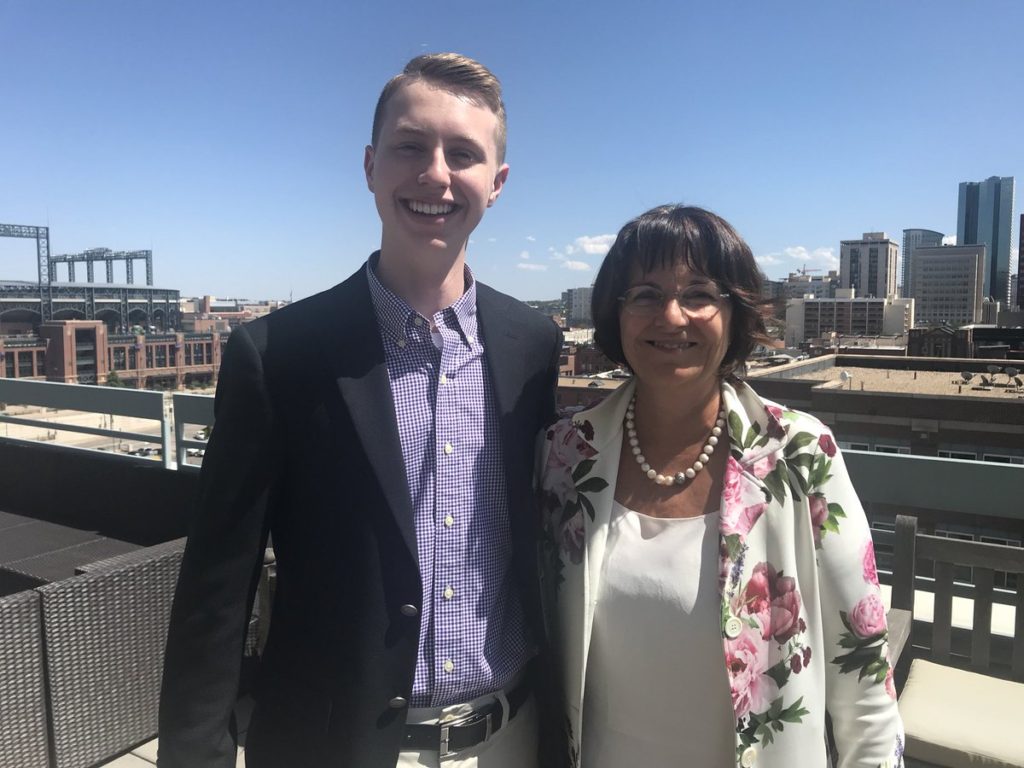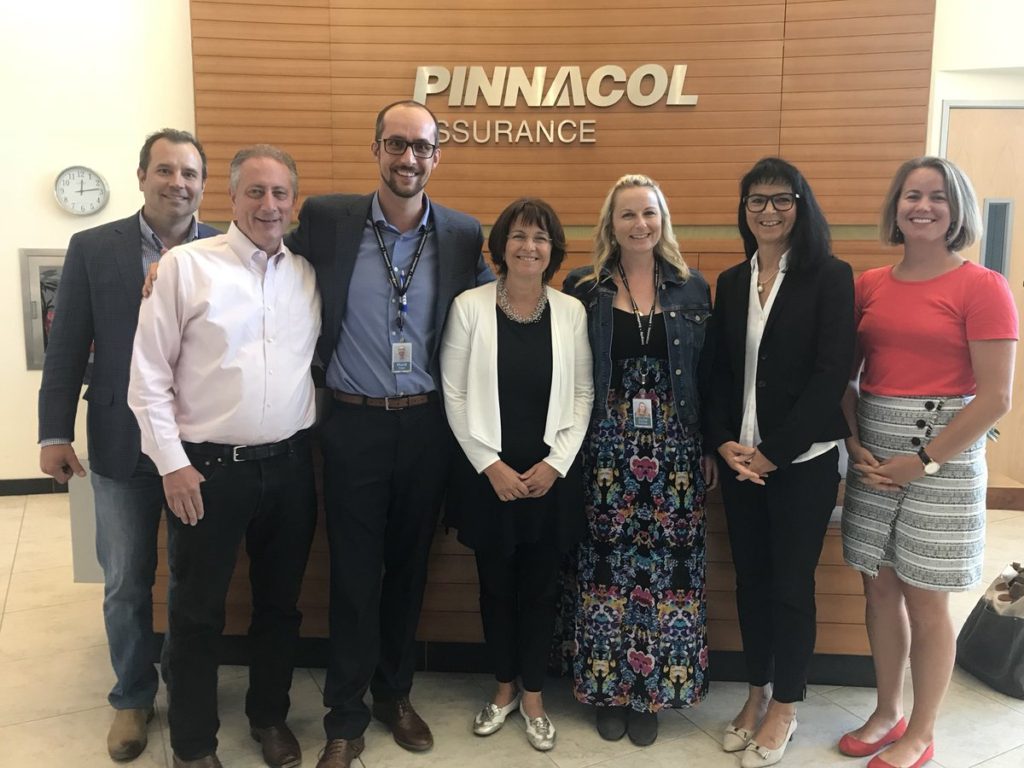Our astrophysics laboratories are home to apprentices in lab tech occupations. Our robots are prototyped by master craftspeople. Maybe our mathematicians apprenticed as polymechanics before finding a passion for theory. Like ETH Zurich, Switzerland as a whole achieves its cutting-edge status with the combination of top academics and its world-leading apprenticeship system.
Apprenticeships as a Swiss Education Export to the US
By Katherine Caves, 20.9.2018
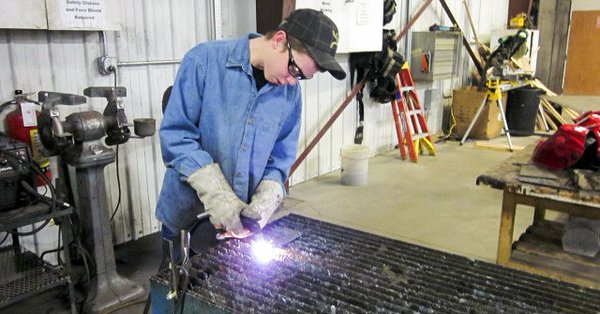
Student Kendall Hood works the plasma cutter. (Photo Credit: Jenny Brundin)
On the surface, ETH Zurich is all about academics. We’re a top university and we’re full of things like astrophysics laboratories, robots, and mathematicians. Below the surface, though, ETH is built just as deeply on a foundation of high-level practical skills.
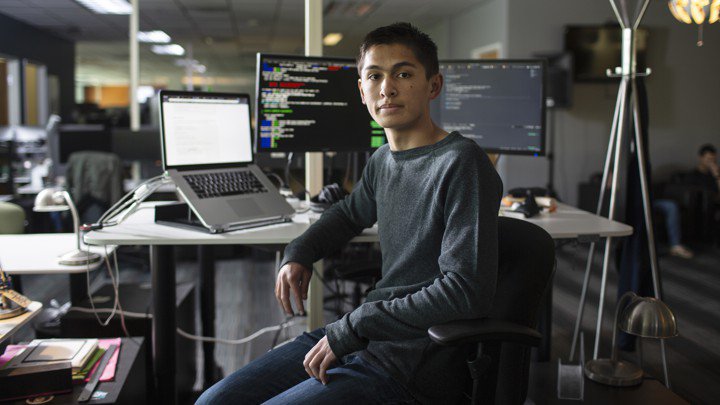
Colin Dean, an apprentice at CareerWise
(photo credit: Nathan Armes / CareerWise)
(photo credit: Nathan Armes / CareerWise)
How do the world’s best apprenticeship systems work?
My research group at ETH Zurich, the Research Division on Comparative Education Systems, studies how the world’s best apprenticeship systems work and helps interested countries work towards success. Through our research on education systems engineering and our annual summer institute, we get to do this work with countries on all six continents. We’re economists and sociologists—our group is part of the KOF Swiss Economic Institute—and we look at everything from systems design and incentives to institutions and youth labor market outcomes to figure out what makes apprenticeships work.
I was in Colorado at the end of August with our division head Dr. Ursula Renold and Dr. Uschi Backes-Gellner, a professor of Business Economics at the University of Zurich who has three decades of experience in researching apprenticeships. The three of us were there to spend the week simultaneously helping and researching one of our very best partner projects: CareerWise Colorado.
The USA does not have a strong apprenticeship system like Switzerland does. There is a Registered Apprenticeship program through the Department of Labor, but that program is nothing like the systems that work well around the world. We’ve found that the best systems offer apprenticeships to young people as part of upper secondary education, use occupational curricula, and give graduates a ticket to both the labor market and further education and training. Registered Apprentices serve participants with an average age of about 30, are unrelated to education, use company-specific curricula, and mainly help graduates continue working where they trained.
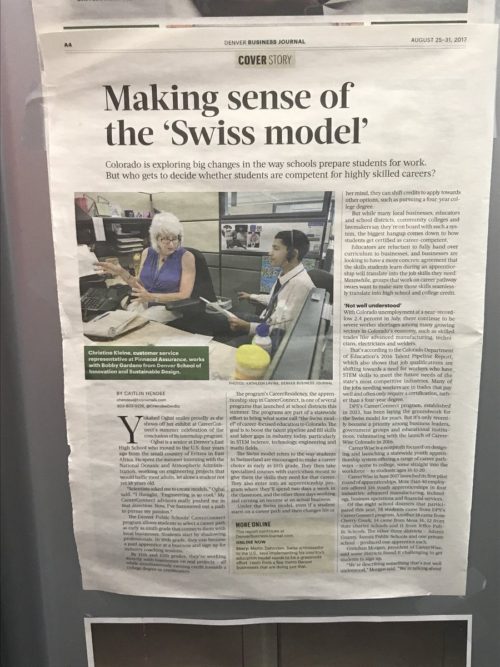
Article in the Denver Business Journal about the CareerWise Colorado project (Photo credit: Ursula Renold)
In light of the widespread “college for all” mentality, student debt crisis, and massive high school dropout problems, a strong apprenticeship system could be a game-changer for American states.
A team from Colorado came to our 2015 summer institute, where they hatched the idea that became CareerWise Colorado.
Noel Ginsburg, an already successful entrepreneur, has led the initiative to build an apprenticeship system in Colorado. Now, in 2018, there are 250 apprentices statewide in 70 companies, making up the first and second pilot cohorts.
This is a huge paradigm shift for Colorado. Taking students out of school feels very risky, companies need to learn how to contribute to curricula, and supervisors have to figure out how to become trainers. Long term, this changes the state’s education system, how youth build their futures, and companies’ role from skills consumers to co-producers.
Despite the difficulty, signs point to this working: companies are already earning returns on their training investments, apprentices are succeeding beyond expectations at work and in school, and the project is building momentum even as it takes on ever more complex challenges.
On this trip, we get to come out of the ivory tower and work on the ground with system-builders, educators, apprentices, businesspeople, and leaders.
We get to contribute what we know from our research and experience – but we’re getting more than that back in inspiration, novel research questions, exciting urgent projects, and new strategic thinking. This part of our work—the travel and jet lag and long days full of meetings—might be the thing some of my colleagues came to academia to avoid. For me, it’s what makes everything worthwhile on the days when I can’t get my econometric model to work, or struggle to mesh diverse theoretical approaches.
On one day, we met people who’d come to the last four summer institutes in service of this project. These are the core group of change agents in education, state government, companies, and CareerWise itself. We set priorities and strategic goals for the project. We brainstormed, got stuck, had a break-through, and argued. By the end of the day, I had a headache.
It was awesome.
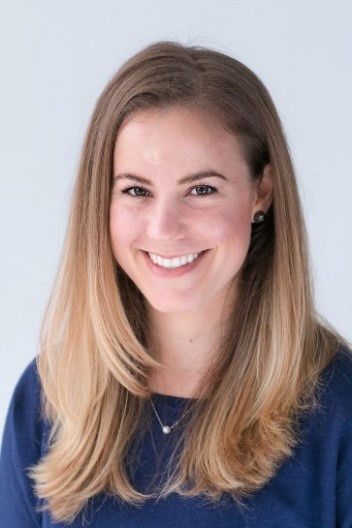
About the author
Katherine Caves is a postdoctoral researcher in the Research Division on Comparative Education Systems at ETH Zurich. She has a bachelor’s degree from the University of California at Berkeley, and earned her master’s degree in the field of Education Policy. Her PhD research was on the economics of education at the University of Zurich. She studies the economic, institutional, and infrastructure foundations of strong vocational education and training (VET) systems all over the world, and how they can be implemented in new contexts. Her research on education systems engineering is part of the Center for the Economics and Management of Education and Training Systems (CEMETS).

